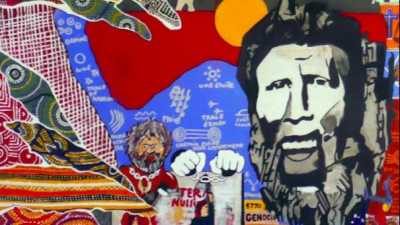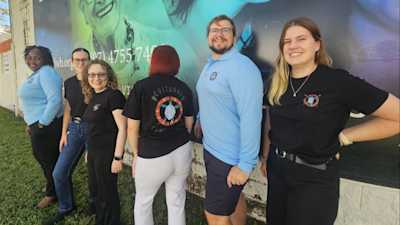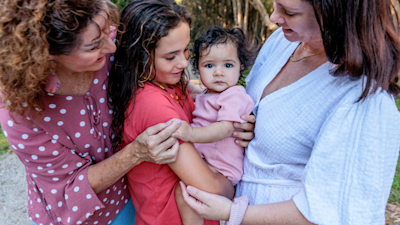The Life Without Barriers hub offers translated resources on the Referendum in multiple languages.

Image: A man in a black hoodie holding a small dog is standing next to a woman with short blonde hair holding a toddler with their face turned away.
We're committed to ensuring that all Australians, regardless of language or cultural background, can access the information needed to make an informed decision in the upcoming vote.
The factsheet was created by a joint effort of Life Without Barriers, Reconciliation Australia, SNAICC – National Voice for our children, the Yes Alliance and Polaron Language Services. This partnership was formed to help create accessible information on the Aboriginal and Torres Strait Islander Voice.
The toolkits, videos and translated information have been created for all Australians and all organisations and individuals are welcome to download and share these resources with your networks.
The current languages which have been translated are: Arabic, Assyrian, Auslan, Bengali, Bosnian, Burmese, Chinese (Simplified and Traditional), Croatian, Dari, Dutch, English, Easy English, Farsi, French, German, Greek, Gujarati, Hindi, Indonesian, Italian, Japanese, Karen, Khmer, Kimberley Kriol, Korean, Macedonian, Malayalam, Maltese, Martu, Nepali, Pashto, Ngaanyatjarra, Plain Language, Polish, Portuguese, Punjabi, Serbian, Sinhalese, Somali, Spanish, Swahili, Tagalog, Tamil, Thai, Turkish, Urdu, Vietnamese and Yumplatok.
What does the factsheet say?
Referendum on Aboriginal and Torres Strait Islander Voice
Australian people come from many lands, practise many faiths and speak many languages. Aboriginal and Torres Strait Islander Peoples are the First Peoples of Australia and have lived here for more than 65,000 years. But Australia’s Constitution doesn’t recognise their unique status. This is why later this year, we will be able to consider a change to our Constitution through a Referendum. All Australians will have a chance to recognise Aboriginal and Torres Strait Islander people in our Constitution, through a Voice that will ensure they are heard on issues that affect them.
What is the Uluru Statement from the Heart?
In May 2017, more than 250 Aboriginal and Torres Strait Islander people issued the Uluru Statement from the Heart. It asks us to create a better future for all of Australia and to include an Aboriginal and Torres Strait Islander Voice in the Australian Constitution.
What is the Aboriginal and Torres Strait Islander Voice?
The Aboriginal and Torres Strait Islander Voice is a way for Aboriginal and Torres Strait Islander people to advise the Government about laws and policies that affect them.
What is a Referendum? A Referendum is when voters are asked to answer Yes or No to a question or questions. The only way to change Australia's Constitution is via a Referendum.
Who can vote in a Referendum?
Only people enrolled to vote can take part in a Referendum. Voting in Referendums is compulsory for enrolled voters.
How do I vote in the Referendum?
Referendums are like elections. On polling day, you can go to a polling place and cast your vote on a ballot paper.
How is a Referendum decided?
For a Referendum to be successful, it needs a double majority. This means a majority of votes in at least four states and across the whole of Australia.
When will the Aboriginal and Torres Strait Islander Voice Referendum be held?
The Aboriginal and Torres Strait Islander Voice Referendum will be held later this year.
What question will the Aboriginal and Torres Strait Islander Voice Referendum ask?
“A Proposed Law: to alter the Constitution to recognise the First Peoples of Australia by establishing an Aboriginal and Torres Strait Islander Voice. Do you approve this proposed alteration?”

Image: Factsheet in English and Urdu | ارُدوُ.
A second factsheet is currently being drafted with further detail.
You can access factsheets in over 45 community translations here, you will also find social media assets and videos. All organisations and individuals are welcome to download and share these resources with your networks.
Voice to Parliament - Translated factsheets in language
Voice to Parliament - Translated social media toolkits
Voice to Parliament - Translated videos
Voice to Parliament - Translations hub
Voice to Parliament - Accessible assets


